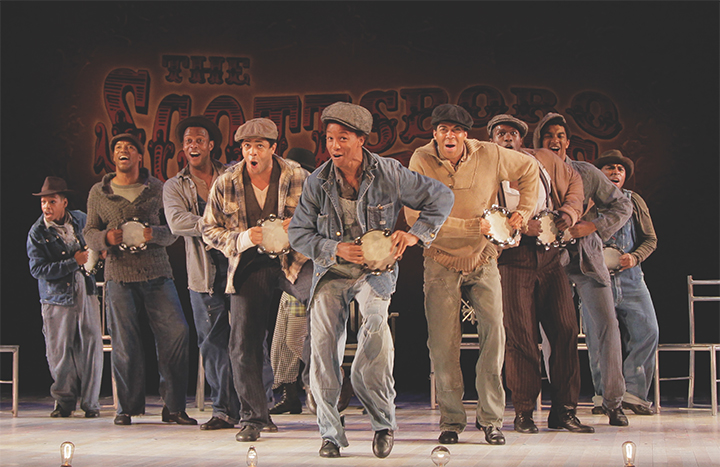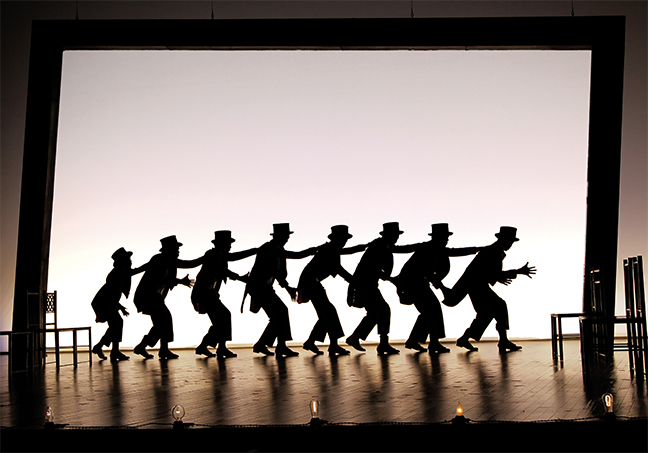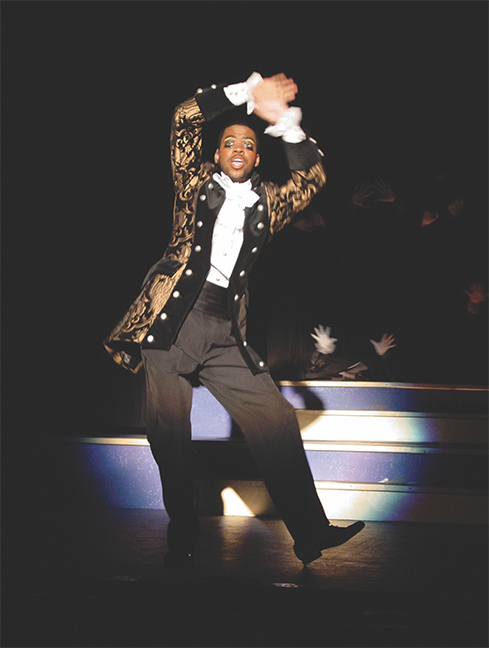
Performing in the limelight takes more than the kiss of talent. Luck plays its role, while plain old hard work and gutsy determination are paramount to rave debuts and long-running careers onstage. And it's the rare performer who finds just the right combination to go from Shocker Gold to the Great White Way.
While some deserving actors toil in chorus-line trenches for decades, others are quick to reap their rewards: Musical theater grad Julius Thomas III ’05 has been lucky (and talented) enough to be the latter, getting his first professional acting gig just months after graduation – and a mere five years later, gearing up for his Broadway debut October 7.
Past professors aren’t surprised that Thomas has seen success so soon.
Marie Allen King, associate professor and program director of opera at Wichita State, says he has “qualities that set him apart from his peers. In addition to his obvious talent and charisma, he displayed a maturity of concentration and focus in his approach to developing his techniques. He was also truly supportive of others, helping them with difficult choreography or acting or singing, and generally inspiring the others to push themselves to a higher level.”
Linda Starkey, associate professor, program director of musical theater and director of WSU’s School of the Performing Arts, remembers a moment when Thomas literally saved the show. She explains that SPA’s 2005 production of Pippin was selected to be performed at the regional Kennedy Center American College Theatre Festival in St. Louis.

Kander and Fred Ebb, book by David Thompson. Directed and
choreographed by Susan Stroman, with set design by Beowulf
Boritt, costume design by Toni-Leslie James and lighting
design by Ken Billington. At the Guthrie Theater in
Minneapolis from July 31-Sept. 25, 2010.
As the Leading Player, Thomas had narrated the show and guided young Prince Pippin through a series of life experiences. Finally, says Starkey, “the Leading Player and the ensemble try to convince Pippin to perform the Grand Finale, burning himself up in a Fire Box that would be the ultimate experience.
When Pippin refuses, the Leading Player and the ensemble turn to the audience to get someone else to take his place. It’s a very dramatic, seductive moment in the show and not really about audience participation.”
But at one KCACTF performance, someone started to come up on stage! It’s every actor’s nightmare to be caught off guard like that. “Julius, however,” Starkey says, “handled the situation and the ‘volunteer’ in an amazing and professional way, ad libbing something about getting him ready for the next show and got him off the stage.”
Audience participation – this time on purpose – is an aspect of the Tony Award-winning musical comedy The 25th Annual Putnam County Spelling Bee, by William Finn and Rachel Sheinkin, which was Thomas’s first production after WSU.
Thomas counts himself lucky he “was able to walk into that audition and get hired. I got rid of Sallie Mae pretty quickly.” The show, as the name implies, is about the on- and off-stage antics of a group of adolescent spellers (and four well-vetted audience members, who appear as other finalists); the New York Times called it “lovably inconsequential and entirely adorable.” Thomas played four of the male characters during his two and a half years with Bee, first in Chicago and then on the first national tour.
Thomas also got to play Terpsichore, the muse of dance, for nine months in the national tour of Xanadu – yes, that Xanadu, of roller skates and Olivia Newton-John fame. He even went to Tokyo with the show, which he calls the highlight of his career so far.
The role, he says, has “such a heightened reality – every line was accompanied by a dance move. It was a real challenge to find ways to physicalize the dialogue. And I got to tap my feet off, which was my first love dance-wise.” He also mentions being pleasantly surprised that not everyone at the audition knew how to roller-skate: “I told my parents I would have to give them a percentage of my check for always taking me roller-skating!”

Performing Arts' production of Pippin, Julius Thomas
narrated the show and guided young Prince Pippin
through a series of life experiences.Pippin was selected
to be performed at the regional Kennedy Center
American College Theatre Festival.
Another favorite production post-college for Thomas was the Radio City Christmas Spectacular, a revue of carols and dancing with which he toured nationally last holiday season. “For a long time I had kind of fallen out of love with Christmas. But seeing how it affected people – it really rekindled my interest in and love for Christmas.”
He also, of course, got to back up the Rockettes.
While touring, he got a call from fellow WSU alum Stephen Kopel ’04, who was casting for a new musical in New York called The Scottsboro Boys, with music by John Kander and Fred Ebb, the team responsible for Cabaret, Chicago and Kiss of the Spider Woman.
Thomas explained he wouldn’t be able to come in to audition; Kopel suggested he put something on video, saying, as Thomas recalls, “‘This never works, but we might be able to drum up interest for later.’ Three days later, he called back to offer me the role.”
In a whirlwind turnaround, Thomas flew to NYC from South Carolina the morning of Jan. 4, after finishing up with the RCCS, and “went straight to rehearsal, baggage and all.” He’s been with Scottsboro Boys ever since, playing Roy Wright – three months off-Broadway, a session this summer at the Guthrie Theater in Minneapolis and soon, the Lyceum Theatre on the Great White Way itself.
The show is based on a series of real-life court cases in the 1930s, wherein nine young African-American men were charged with having raped two white women on a freight train.
The defendants’ attorneys had little criminal law experience, and all were quickly convicted by all-white juries; but their cases were appealed all the way to the Supreme Court, whose decisions helped establish a right to competent counsel and that African-Americans could not be excluded from juries simply because of their race.
It’s heavy material, admits Thomas, making him glad to have two months of downtime between off-Broadway and Minneapolis: “It was fantastic to take a breath from it. But you come back and have a different idea as to how the show can change and evolve; they’ve made some fantastic choices that have really pushed the show to a different level.” It’s also been a challenge for his dancing skills. He remembers telling choreographer Susan Stroman in rehearsals, “Good work, Susan – we’re only halfway through the show and you’ve used every trick I have in my bag!”
There’s no doubt Thomas has a stellar career ahead of him – and no doubt either that he’ll ever forget his roots. “Every time I have a bio in a program, I have to mention WSU. I’m so proud to represent the school."





